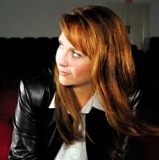
Brahms, Britten Pairing Promises Powerful Seasonal Reflection
Election Day will soon be behind us, but win or lose, there
is always music.

Coming up in Cincinnati this week is a major choral/orchestral event, a pairing by the Cincinnati Symphony Orchestra and May Festival Chorus of Brahms’ “A German Requiem” and Benjamin Britten’s “Sinfonia da Requiem.” CSO music director Paavo Järvi will conduct.
Concerts are 8 p.m. Friday and Saturday (Nov. 7 and 8) at Music Hall. Soloists in the Brahms Requiem are soprano Heidi Grant Murphy and baritone Matthias Goerne.
Though both are
called “Requiem,” neither work fits the
liturgical definition (Roman Catholic Mass for the Dead) but have broader connotations.


Brahms’ “Requiem” is a very personal statement influenced by the deaths of his mother and his friend Robert Schumann. It was composed to German biblical texts selected by the composer. There is a reference to a mother’s love in the fifth movement: “As one whom his mother comforteth, so will I comfort you” (Isaiah 66:13).
There is no “Dies Irae” though the sixth movement “Denn wir haben hier keine bleibende Stadt” (“For here we have no lasting city”) powerfully evokes the reality of death, concluding, however, “O Death Where is Thy Sting?” Famous movements are the lilting “How Lovely are They Dwelling Places” and “For All Flesh is as Grass,” a funeral march that builds to a tremendous climax but with a calmer mid-section. The overriding theme of Brahms' Requiem is hope, and it is targeted more toward comforting the bereaved than offering prayers for the dead.
(Personal note: I may never hear Brahms’ Requiem again free of the context in which I last heard it, on a lake in south Estonia with bonfires blazing on the opposite bank. Somehow its universal message seemed quite at home there.)
Britten’s Sinfonia da Requiem is purely symphonic, i.e. voices are not used. The composer wrote it in 1940 on a commission from the Japanese government to honor the 2600th anniversary of the Mikado dynasty. It was rejected as unsuitable – insulting even, with its Christian titles. Dedicated to the composer’s parents, the three-movement, 20-minute work (“Lacrymosa,” “Dies Irae,” “Requiem Aeternam”) is a powerful anti-war statement by the pacifist Britten. Scored for a large orchestra and influenced by Mahler, among others, it is considered his finest orchestral work.
Tickets are $12-$95, $10 for students ($12 the day of the concert), 25-percent off for seniors, at www.cincinnatisymphony.org or call (513) 381-3300.
NOTE: The prices quoted amount to an increase in CSO ticket prices. Formerly, student tickets were a flat $10 and seniors were half-price. In addition, the CSO’s popular ZIPTIX discount, i.e. 50-percent off from 11 a.m. to 2 p.m. concert days, has been reduced to 25-percent.